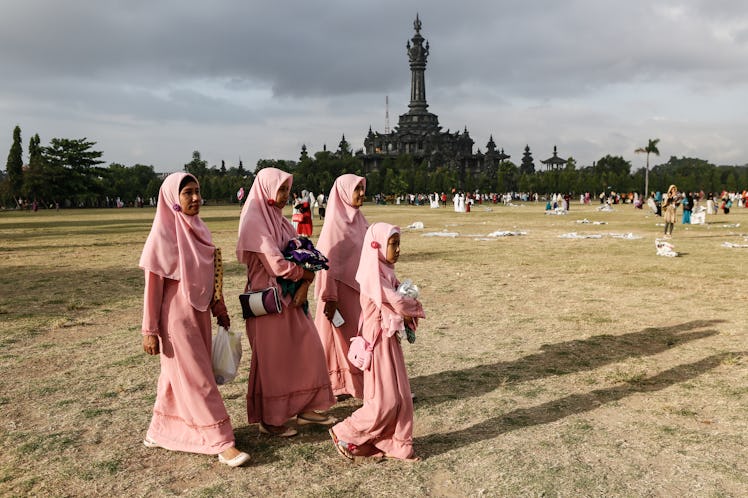
How The Night Becomes A Place Of Healing During Ramadan
We stand shoulder to shoulder when we pray, with no gaps between our bodies. It doesn’t take long to get used to a stranger pulling you along the row when a latecomer shrugs their shoes off and joins in, ready to exhale when the entire congregation breathes "ameen" into the air. Such a moment occurs a million times around the world in the month of Ramadan. It sweeps across mosques, prayer rooms, living rooms, and tents set up in major cities, where Muslims seek the certainty of knowing they are a part of something bigger than themselves and receive that comfort in night prayers, organized feasts, and the sound of stomachs rumbling, part of a chorus participating in the very same dusk-to-dawn fast. In this month, the night becomes a healing place, familiar for the universal bonding experience it offers to those of us who practice the religion.
I prayed in my first mosque in the month of Ramadan, which is when I first experienced the tradition of nightly prayers and what they represent: the quiet unity of a whole community standing together with the sole intention of wanting to please God. I was a teenager — nervous around strangers and definitely not used to the feeling of an elderly lady tucking my hijab into the back of my shirt, fixing it for me while I muttered my prayers along with everyone else. When I’d finished, I looked for her, but giving thanks seemed to contradict such familial intimacy, the fact of which is a constant in every women’s prayer section I’ve frequented thus far.
They are often smaller than the men’s and sometimes receive less attention than they require, but the women’s prayer sections are beloved and sought out, especially during Ramadan, as women enter a night that feels holier and more forgiving than any other time of the year. They are places for quiet communing, for conversations and circles that prioritize our wellbeing and make space for us. That very first time attending one, the sight of others clustering in groups, rushing to the side door, and holding it open behind them both calmed my first-time jitters and taught me something of the unity of my faith. We give up food, drink, and sleep for God during Ramadan. We want to be better than we are throughout the rest of the year. And we accept the vulnerability — the hunger, the misunderstanding, the owning up to the darker parts of our hearts — that our choices give us. It’s a certainty.
For instance, I know I’m not the only visibly Muslim woman who’s received "be careful out there" texts from her parents. Though I may associate the darkness during Ramadan with rushing to pray at the mosque, guiding others to the entrance, and keeping my Qur’an still over my crossed knees, the threat of violence still so often steals Muslim women away, as was the case for Nabra Hassanen, a Virginia teenager who was assaulted and murdered while returning to a mosque at night last June. It’s pressing, even while we try not to prioritize such fears, wanting to practice our faith with honesty in a month where this should be all that’s asked of us.
And in Ramadan, the want to be holy, and just, and kind is important. It reveals itself over the act of prayer that cooking becomes, aching legs at extra-long recitations at the mosque, and meals packed for charity drives. It reveals itself over Nike sliders being used as bathroom slippers at the mosque, someone interrupting the imam with stifled laughter, and students having spice-offs in prayer rooms — daring one another to devour hot noodles in moments of reckless abandonment, swapping a single hour of breakfast with a burning tongue and an empty stomach, because it feels like a good idea. It reveals itself in the hours spent in darkness we look forward to: the need to replenish a soul by considering how much we wrong ourselves in refusing to listen, or help, or give when we have the chance.
And those hours spent in darkness are the same ones that the prophets of our faith had. They are the same ones countless others will know. Every time Muslims find themselves awake in them, there is a compulsion, deep inside, that considers how we can heal ourselves so that we might witness healing elsewhere.
In the night, with my tired eyes staring through a piece of toast, I know things will feel quiet. Delicate, like daybreak. It reminds me of the Muslim belief that God descends to the lowest heaven in Ramadan to witness those of us trying to be better than what befalls us. It’s difficult to do that, to be the people trying to befriend the darkness of the night, and those who sometimes don’t want to befriend us, and what resides within ourselves. How do you make that darkness tender? Is it through our tired excitement for our month? And the tired rebuttals to the question "not even water?" And the practicing of our faith with dignity, just as we have done, and try to, and will?
I think so.